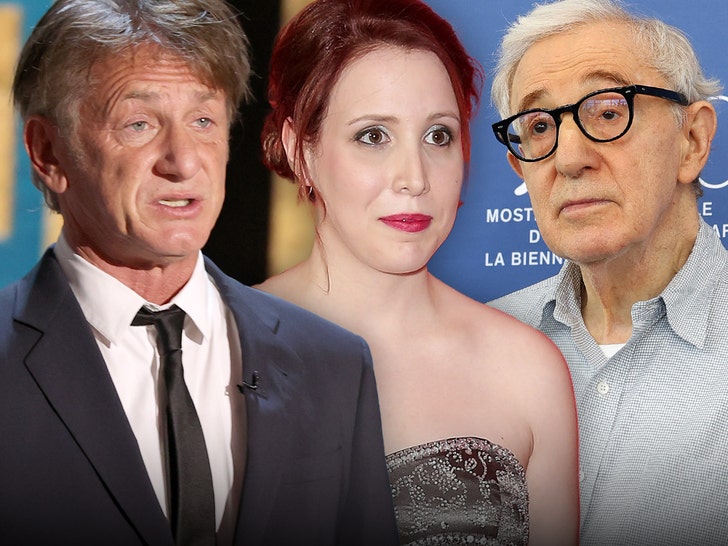Sean Penn Doubts Dylan Farrow's Sexual Assault Claims Against Woody Allen

Quick Read
Sean Penn Doubts Dylan Farrow's Sexual Assault Claims Against Woody Allen
Sean Penn Questions Dylan Farrow’s Allegations Against Woody Allen, Sparking Debate
Hollywood is no stranger to controversy, but when a figure as outspoken as Sean Penn weighs in on a decades-old scandal, the conversation reignites with fresh intensity. In a recent interview, the Academy Award-winning actor expressed skepticism about Dylan Farrow’s sexual assault allegations against her adoptive father, filmmaker Woody Allen. Penn’s comments have stirred a heated discussion, raising questions about truth, accountability, and the complexities of high-profile accusations. Here’s what you need to know about this unfolding story and why it matters.
A Controversial Stance from a Hollywood Heavyweight
Sean Penn, known for his bold opinions and unfiltered commentary, didn’t hold back when discussing the allegations against Woody Allen. During a candid conversation on a popular podcast, Penn suggested that Farrow’s claims—first made public in the early 1990s and reiterated in recent years—may lack credibility. While he stopped short of dismissing the accusations entirely, Penn argued that the passage of time, conflicting accounts, and lack of definitive evidence make it difficult to take a firm stance.
Penn’s remarks come at a time when Hollywood continues to grapple with the #MeToo movement’s legacy. His decision to question Farrow’s story has drawn both support from those wary of unproven allegations and sharp criticism from advocates who see his comments as undermining survivors of abuse. For Noyzy News readers, this moment underscores the ongoing tension between public opinion and personal truth in the entertainment industry.
Revisiting the Allegations: A Timeline of the Woody Allen Case
To understand the weight of Penn’s comments, it’s essential to revisit the history of the allegations:
1992: The Initial ClaimsDylan Farrow, then seven years old, alleged that Woody Allen sexually assaulted her at the family’s Connecticut home. The accusations emerged amid a contentious custody battle between Allen and Farrow’s mother, Mia Farrow, following their high-profile breakup.
Investigations and Legal OutcomesTwo separate investigations—one by the Connecticut State Police and another by the Yale-New Haven Hospital’s child sexual abuse clinic—found no conclusive evidence to support the allegations. Allen was never charged, though he has consistently denied the claims.
2014: Farrow Speaks OutDylan Farrow, now an adult, published an open letter in The New York Times, reaffirming her allegations and criticizing Hollywood’s continued embrace of Allen. Her letter fueled renewed scrutiny of the director’s legacy.
2021: HBO DocumentaryThe documentary series Allen v. Farrow revisited the case, presenting interviews with Dylan, Mia Farrow, and others close to the family. The series sparked widespread debate, with some praising its advocacy for survivors and others questioning its one-sided narrative.
Penn’s skepticism appears to align with those who point to inconsistencies in the case, including Allen’s steadfast denials and the lack of criminal charges. However, his comments risk alienating those who view Farrow’s persistence as a courageous stand against a powerful figure.
Why Penn’s Comments Matter
Sean Penn’s decision to publicly question Farrow’s allegations isn’t just a celebrity soundbite—it’s a flashpoint in a broader cultural conversation. Here’s why his remarks resonate:
The #MeToo EraThe #MeToo movement empowered countless survivors to share their stories, but it also raised questions about how to handle allegations without definitive proof. Penn’s doubts reflect a perspective that some feel has been sidelined: the need for evidence in the court of public opinion.
Hollywood’s Divided LoyaltyWoody Allen remains a polarizing figure. While some studios and actors have distanced themselves from him, others continue to admire his work. Penn’s comments highlight the industry’s struggle to balance artistic legacy with moral accountability.
The Role of Public FiguresAs a prominent actor with a history of activism, Penn’s words carry weight. His willingness to challenge a widely accepted narrative may embolden others to speak out, but it also risks trivializing the experiences of those who feel silenced.
The Public’s Response: A Divided Reaction
Penn’s remarks have ignited a firestorm online, with social media platforms buzzing with opinions. Supporters argue that he’s bravely questioning a narrative that’s been too readily accepted, pointing to the complexities of the Allen-Farrow case. Critics, however, accuse Penn of dismissing a survivor’s story, with some calling his comments insensitive in the context of #MeToo.
On platforms like X, users have shared a range of perspectives:
Some praise Penn for highlighting the importance of due process.
Others argue that questioning Farrow’s credibility perpetuates a culture that discourages survivors from coming forward.
A few fans of Allen’s films express relief that the director still has defenders in Hollywood.
This polarized response underscores the challenge of navigating allegations in the public eye, where nuance often gives way to outrage.
What’s Next for the Conversation?
Sean Penn’s comments are unlikely to resolve the debate surrounding Woody Allen and Dylan Farrow, but they’ve undoubtedly reopened old wounds. For Farrow, who has spent years advocating for her truth, Penn’s skepticism may feel like a setback. For Allen, whose career has been overshadowed by these allegations, the remarks offer a rare public defense.
As Hollywood continues to wrestle with its past, this story serves as a reminder of the complexities of justice and belief. Whether Penn’s remarks will shift public opinion or simply fade into the noise remains to be seen. What’s clear is that the conversation about accountability, evidence, and empathy is far from over.
Conclusion: A Story That Refuses to Fade
Sean Penn’s decision to question Dylan Farrow’s allegations against Woody Allen has thrust a decades-old controversy back into the spotlight. For Noyzy News readers, this isn’t just about one actor’s opinion—it’s about the broader questions of how we judge, who we believe, and what it means to seek truth in a world of competing narratives. As the debate rages on, one thing is certain: this story, like so many in Hollywood, is anything but black-and-white.






